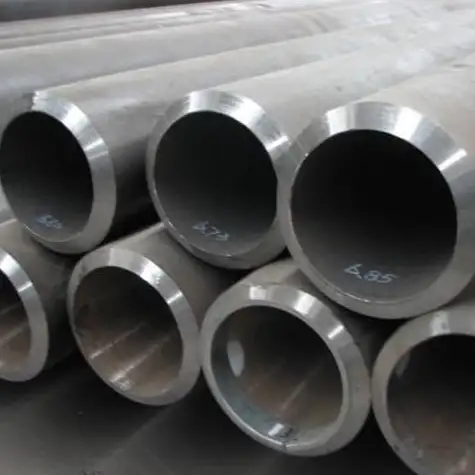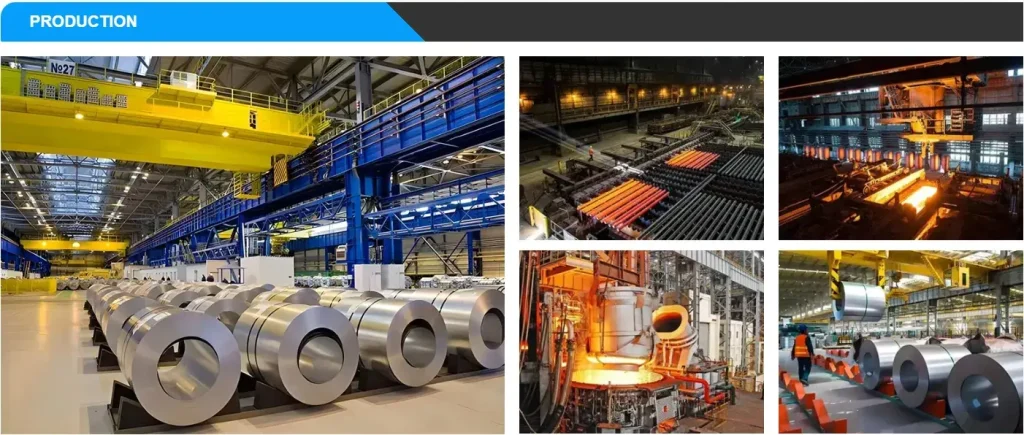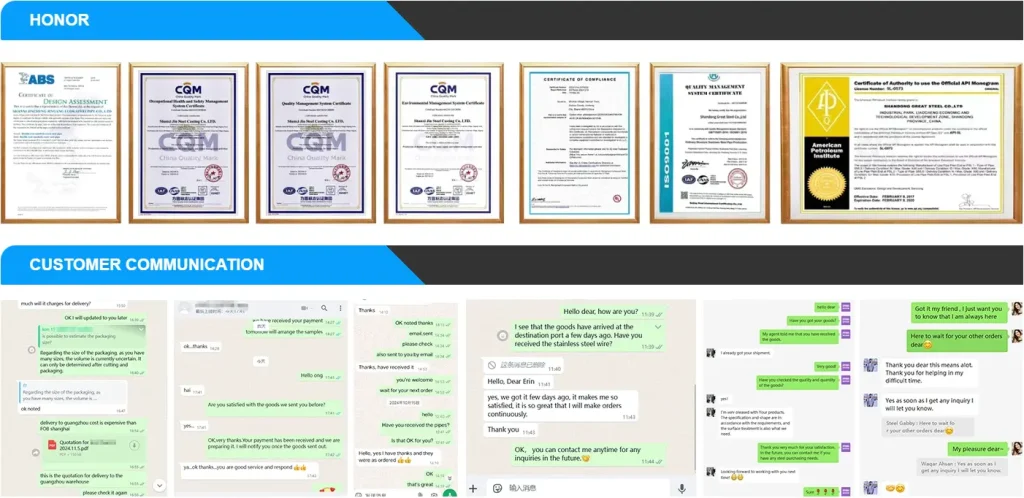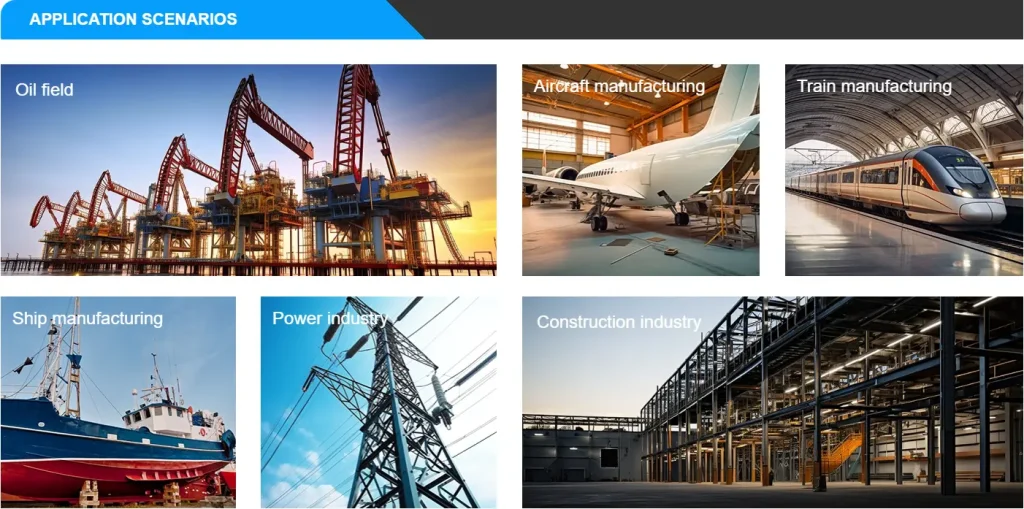As a metal materials expert here at Luokaiwei, I often get asked about specialized alloys, and AISI 4140 steel pipe is certainly a standout in the field. When we talk about 4140 pipe, we’re discussing a material that offers an exceptional balance of strength, toughness, and versatility, making it a preferred choice for demanding applications across numerous industries. My direct assessment is that AISI 4140 steel pipe provides superior performance where high strength, good fatigue resistance, and excellent machinability are critical, especially after proper heat treatment. It’s a premium product that justifies its cost through its durability and reliability in challenging environments. Here at Luokaiwei, we pride ourselves on offering AISI 4140 steel pipe directly from our factory at 100% factory prices, with full support for custom services to meet your exact project specifications. We ensure you receive the precise quality and dimensions you need, without unnecessary markups.
What is AISI 4140 Steel Pipe? Understanding Its Core Characteristics
AISI 4140 is a chromium-molybdenum alloy steel renowned for its excellent combination of strength, toughness, wear resistance, and hardenability. It belongs to the “41xx” family of steels, which signifies its chromium and molybdenum content as primary alloying elements, setting it apart from plain carbon steels. The “40” in 4140 denotes a nominal carbon content of 0.40%.
In pipe form, AISI 4140 leverages these properties to serve various structural and fluid conveyance needs in high-stress applications. Unlike common carbon steel pipes, 4140 pipe is specifically designed to be heat-treated (quenched and tempered) to achieve superior mechanical properties. This heat treatment process transforms its microstructure, enhancing its tensile strength, yield strength, and impact resistance far beyond what standard carbon steels can offer. My years in this industry have consistently shown that when a project requires a pipe to endure significant loads, high pressures, or harsh operating conditions, 4140 is frequently the material of choice.
Chemical Composition of AISI 4140 Steel
The specific chemical composition of AISI 4140 steel is the foundation of its remarkable properties. The careful balance of these elements ensures its hardenability, strength, and machinability. Below is a typical composition range:
| Element | Weight Percentage (%) | Role in Steel Properties |
| Carbon (C) | 0.38 – 0.43 | Primary hardening element, increases strength and hardness. |
| Manganese (Mn) | 0.75 – 1.00 | Improves hardenability, strength, and deoxidation. |
| Phosphorus (P) | leq0.035 | Impurity, kept low to prevent brittleness. |
| Sulfur (S) | leq0.040 | Impurity, kept low; improves machinability if controlled. |
| Silicon (Si) | 0.15 – 0.35 | Deoxidizer, enhances strength and elasticity. |
| Chromium (Cr) | 0.80 – 1.10 | Increases hardenability, wear resistance, and high-temperature strength. |
| Molybdenum (Mo) | 0.15 – 0.25 | Increases hardenability, toughness, creep resistance, and hot strength. |
| Iron (Fe) | Balance | Base metal. |
Note: These ranges are typical for AISI 4140. Minor variations may occur based on specific standards (e.g., ASTM, EN) or manufacturer practices, but they will remain within the accepted AISI 4140 designation.
Mechanical Properties and Performance of AISI 4140 Pipe
The true value of AISI 4140 pipe becomes evident when we look at its mechanical properties, especially after it has been properly heat-treated (quenched and tempered). This process optimizes its microstructure for maximum performance.
Here are typical mechanical properties for AISI 4140 steel in the quenched and tempered condition, often suitable for pipe applications:
| Property | Typical Value (Quenched & Tempered) | Metric Equivalent | Importance |
| Tensile Strength (UTS) | 135,000 – 180,000 psi | 930 – 1240 MPa | Maximum stress the material can withstand before breaking. |
| Yield Strength (YS) | 100,000 – 145,000 psi | 690 – 1000 MPa | Stress at which the material begins to deform permanently. |
| Elongation in 2 inches (%) | 15 – 20 | Measure of ductility; ability to stretch without fracturing. | |
| Reduction of Area (%) | 50 – 60 | Measure of ductility; ability to neck down before fracture. | |
| Hardness (Brinell) | 280 – 340 HB | Resistance to indentation, indicates wear resistance. | |
| Impact Strength (Charpy V-Notch) | 20 – 40 ft-lbs | 27 – 54 Joules | Ability to absorb energy and deform plastically before fracturing. |
These properties allow 4140 pipe to handle high internal pressures, external loads, and resist fatigue cracking in dynamic environments. My experience shows that while it’s strong, 4140 also offers sufficient toughness to prevent brittle failure, a critical attribute for safety-sensitive applications.
Typical Specifications and Dimensions for AISI 4140 Pipe
AISI 4140 pipe is manufactured to meet various industry standards, ensuring dimensional accuracy and performance. The most common forms are seamless pipes, produced from solid billets, offering superior integrity for pressure applications.
Here are typical specifications and dimensions:
| Parameter | Common Ranges/Standards | Notes |
| Outer Diameter (OD) | 1 inch (25.4mm) to 24 inches (609.6mm) + | Can vary significantly based on application. Larger diameters for structural or large-volume fluid transfer. |
| Wall Thickness | Sch 40, Sch 80, Sch 120, Sch 160, XS, XXS (as per ASME B36.10M) | Schedule indicates wall thickness relative to OD. Higher schedule = thicker wall = higher pressure rating. Also available in specific millimeter or inch thicknesses. |
| Length | 6 meters (20 ft), 12 meters (40 ft), or custom lengths | Standard mill lengths are common. Custom cutting to specific project requirements is often available, though it may incur additional charges. |
| Manufacturing Method | Seamless (most common for demanding applications) | Produced by piercing a solid billet. Offers superior strength, integrity, and uniform wall thickness for high-pressure or critical structural uses. Welded 4140 is less common for pipe. |
| End Finish | Plain End (PE), Beveled End (BE), Threaded and Coupled (T&C) | PE for welding or socket welding. BE for butt welding. T&C for mechanical connections (less common for large sizes of 4140). |
| Standard | ASTM A519 (for seamless mechanical tubing), API 5CT (for OCTG) | Other standards like EN 10297-1, DIN 17200 may also apply depending on region/application. |
When ordering, precise specifications are paramount. My team at Luokaiwei works closely with clients to ensure the correct OD, wall thickness, length, and manufacturing standard are chosen for their specific needs.
Manufacturing Process for AISI 4140 Steel Pipe
The production of high-quality AISI 4140 steel pipe is a multi-stage process, demanding precision and careful control at each step.
- Steelmaking: The process typically begins in an Electric Arc Furnace (EAF) or Basic Oxygen Furnace (BOF) where raw materials (scrap steel, iron ore, fluxes, alloying elements) are melted. The molten steel is then refined through processes like ladle metallurgy to achieve the precise chemical composition of 4140, with strict control over carbon, chromium, and molybdenum.
- Casting: The refined molten steel is cast into billets, which are long, solid blocks of steel. Continuous casting is the most common method for efficiency.
- Billet Preparation: The billets may be conditioned (surface ground or peeled) to remove any surface defects before further processing.
- Pipe Formation (Seamless): For seamless pipe, which is predominantly how 4140 pipe is produced due to its demanding applications:
- The billet is heated to a high temperature.
- A rotary piercing mill then pierces the hot billet, creating a hollow shell or “bloom.”
- This hollow shell is then elongated and sized through various rolling and stretching operations (e.g., mandrel mill, stretch reducing mill) to achieve the desired outer diameter and wall thickness.
- Heat Treatment: This is a crucial step for AISI 4140 pipe.
- Quenching: The pipe is heated to a high temperature (austenitizing temperature) and then rapidly cooled in a medium like oil or water. This creates a very hard but brittle microstructure (martensite).
- Tempering: The quenched pipe is then reheated to a lower temperature (tempering temperature) and held for a specific time, followed by cooling. This process reduces brittleness, increases toughness, and adjusts the final hardness and strength to the desired levels. Precise control over tempering temperature is critical to achieve the specified mechanical properties.
- Finishing Operations: After heat treatment, the pipes undergo various finishing steps:
- Straightening: To ensure the pipe is straight and free of bends.
- Cutting: To standard or custom lengths.
- End Finishing: Beveling, threading, or plain end preparation.
- Inspection: Non-destructive testing (NDT) methods like ultrasonic testing, eddy current testing, and magnetic particle inspection are commonly used to detect internal or surface flaws. Dimensional checks are also performed.
- Coating/Marking: Application of protective coatings (e.g., varnish) and marking for identification.
At Luokaiwei, we maintain stringent quality control throughout this entire manufacturing chain, from raw material sourcing to final inspection, ensuring every AISI 4140 pipe meets the highest standards.
Key Advantages of Choosing AISI 4140 Steel Pipe
My experience confirms that AISI 4140 pipe offers a compelling set of advantages for engineers and project managers facing challenging requirements:
- High Strength and Toughness: After quenching and tempering, 4140 achieves excellent tensile and yield strengths, enabling it to withstand heavy loads and internal pressures. Crucially, it retains good toughness, resisting brittle fracture.
- Superior Wear Resistance: The chromium and carbon content contribute to its ability to resist abrasive wear, making it suitable for applications where material degradation from friction is a concern.
- Good Fatigue Resistance: Its high strength and fine grain structure after heat treatment provide excellent resistance to fatigue, meaning it can endure repeated stress cycles without failing prematurely. This is vital for dynamic machinery components or pipelines with pulsating flows.
- Excellent Machinability: Despite its high strength, AISI 4140 exhibits good machinability in its annealed or pre-hardened condition, making it easier to fabricate into complex shapes and achieve tight tolerances.
- Consistent Hardenability: The chromium and molybdenum in 4140 ensure consistent through-hardening even in relatively large sections, providing uniform properties across the pipe wall.
- Versatility: Its balanced properties make it adaptable to a wide array of applications across diverse industries, from oil & gas to automotive and heavy machinery.
- Cost-Effectiveness (Long-Term): While its initial cost is higher than plain carbon steel, its extended lifespan, reduced maintenance, and superior performance in demanding conditions often lead to significant long-term cost savings.
Global Market Price Outlook for AISI 4140 Steel Pipe
The price of AISI 4140 steel pipe is influenced by global steel market trends, raw material costs (iron ore, coking coal, scrap, ferroalloys like chromium and molybdenum), energy prices, production capacity, and regional demand. Because it’s an alloy steel requiring specific processing, its price per unit weight is notably higher than that of standard carbon steel.
As of late 2024 / early 2025, the global steel market shows signs of stabilization but remains susceptible to geopolitical events and economic shifts.
Here’s an illustrative price range for seamless AISI 4140 steel pipe, typically in an un-heat-treated (as-rolled or normalized) condition, and then for the more common quenched and tempered condition, based on a typical volume purchase (e.g., 5-20 tons). Prices are per metric ton (MT) or per pound (lb) for global comparison.
| Region/Form | Estimated Price Range (USD/MT) | Estimated Price Range (USD/lb) | Notes |
| China/Asia (Mill Direct) | $1,800 – $2,500 | $0.82 – $1.13 | Competitive pricing, major production hub. |
| Europe (Ex-Works) | $2,200 – $3,000 | $1.00 – $1.36 | High quality, subject to regional energy costs and environmental regulations. |
| North America (Delivered) | $2,500 – $3,500 | $1.13 – $1.59 | Higher labor and energy costs, potential import duties. |
| Quenched & Tempered (Global Avg) | $2,800 – $4,500+ | $1.27 – $2.05+ | Heat treatment adds significant cost, enhancing mechanical properties. |
Disclaimer: These prices are estimates and subject to rapid change based on raw material market fluctuations, energy costs, trade policies, and specific supplier agreements. Always obtain a formal quote for current pricing.
Comparing AISI 4140 Pipe with Other Common Steel Pipe
Understanding how AISI 4140 pipe compares to other widely used steel pipes is crucial for informed material selection.
- AISI 4140 vs. Standard Carbon Steel Pipe (e.g., ASTM A53, A106):
- Strength & Toughness: 4140 is significantly stronger and tougher, especially after heat treatment, due to its alloy content. Carbon steels are generally softer and less strong.
- Hardenability: 4140 has excellent hardenability, allowing for through-hardening in larger sections. Carbon steels have limited hardenability.
- Wear Resistance: 4140 offers superior wear resistance.
- Cost: Carbon steel pipe is considerably more affordable.
- Application: Carbon steels are for general-purpose applications (low-pressure fluid conveyance, non-critical structures). 4140 is for high-stress, critical applications where performance is paramount.
- AISI 4140 vs. AISI 4340 Steel Pipe:
- Nickel Content: 4340 contains nickel (typically 1.65 – 2.00%), which 4140 lacks.
- Toughness: The addition of nickel makes 4340 generally tougher and more ductile than 4140 at the same strength level, especially in larger sections or after severe quenching. It also exhibits slightly better hardenability.
- Cost: 4340 is usually more expensive due to the nickel content.
- Application: Both are high-strength alloy steels. 4340 is often chosen for even more critical applications requiring maximum toughness and fatigue strength, particularly in very large sections or where high impact resistance at lower temperatures is needed (e.g., aircraft landing gear, heavy-duty crankshafts). 4140 remains excellent for a wide range of demanding uses.
- AISI 4140 vs. Stainless Steel Pipe (e.g., 304/316):
- Corrosion Resistance: Stainless steels offer vastly superior corrosion resistance due to their high chromium content, which forms a passive oxide layer. 4140 will rust without protective coatings.
- Strength (as-is): 4140, especially heat-treated, can achieve higher tensile strengths than common austenitic stainless steels (like 304/316) in their annealed condition.
- Cost: Stainless steel pipe is typically much more expensive than 4140 due to its nickel and higher chromium content.
- Application: Stainless steel is chosen for corrosive environments (food processing, chemical plants, marine). 4140 is for high-strength structural or mechanical applications where corrosion is managed by other means or is not the primary concern.
My job often involves helping clients weigh these trade-offs, ensuring they select the most appropriate and cost-effective material for their specific operational demands.
Diverse Applications of AISI 4140 Steel Pipe
The balanced properties of AISI 4140 make its pipe form invaluable across a broad spectrum of industries and applications:
- Oil and Gas Industry: This is a major consumer. AISI 4140 pipe is used for downhole drilling tools, drill collars, pump shafts, couplings, and other components requiring high strength and fatigue resistance in demanding subsurface environments. Its ability to withstand high pressures and torsional stresses is crucial here.
- Hydraulic Cylinders and Components: Precision hydraulic cylinders, piston rods, and hydraulic lines benefit from 4140’s strength, good machinability for internal finishes, and ability to hold high pressure.
- Automotive and Heavy Equipment: Axle shafts, spline shafts, connecting rods, and various structural components in trucks, tractors, and construction machinery utilize 4140 pipe or tubing for its excellent strength-to-weight ratio and wear resistance.
- General Machinery and Manufacturing: Shafts, gears, spindles, machine tool parts, and structural members in manufacturing equipment frequently employ 4140 for its durability and dimensional stability after heat treatment.
- Structural Applications: While less common for large building structures, 4140 pipe can be found in specialized high-load structural frameworks, support columns, or cross-members where high strength and compact design are critical.
- Mining Equipment: Components in drilling rigs, crushers, and conveyors benefit from 4140’s toughness and wear resistance in abrasive mining environments.
Case Study: High-Pressure Pipeline Project in Oman
I recall a particularly challenging project we supported in Oman. The client was developing a new section of a high-pressure oil and gas pipeline that needed to cross a highly corrosive desert environment, with sections requiring extreme pressure resistance and integrity due to significant elevation changes and volatile fluid properties. They initially considered standard high-strength low-alloy (HSLA) steel pipes, but concerns over long-term fatigue life and localized stress corrosion cracking in specific high-stress zones led them to seek a more robust solution.
The Challenge: The pipeline required sections of pipe with exceptional yield strength to manage the extreme internal pressures, high toughness to resist potential brittle fracture from ground movement or external impact, and consistent metallurgical properties across large diameters and lengths. Standard pipe was deemed insufficient for these critical sections.
The Luokaiwei Solution: We proposed and supplied AISI 4140 seamless steel pipe, specifically manufactured to meet API 5CT standards for casing and tubing, and then carefully quenched and tempered to achieve a yield strength exceeding 110,000 psi (760 MPa) while maintaining excellent toughness (Charpy V-notch impact values well above 40 ft-lbs at critical temperatures).
Our Contribution:
- Custom Production: We leveraged our expertise in alloy steel production to precisely control the chemical composition and heat treatment parameters of the 4140 steel, ensuring every length of pipe met the stringent mechanical property requirements.
- Seamless Integrity: Our seamless manufacturing process provided the inherent integrity required for high-pressure applications, minimizing the risk of weld defects.
- Rigorous Testing: Each pipe underwent extensive non-destructive testing (ultrasonic, eddy current) and destructive mechanical testing (tensile, impact, hardness) to provide comprehensive Mill Test Certificates, assuring the client of the pipe’s quality and performance.
- Logistical Support: We coordinated shipping to the port in Oman, managing the complexities of international freight for large, heavy pipe sections.
Outcome: The AISI 4140 pipe sections were installed successfully and have been performing flawlessly in the pipeline, providing the required safety margin and operational reliability in a very demanding environment. This project highlighted how Luokaiwei’s ability to provide high-quality, custom-engineered alloy steel pipe at competitive factory prices directly contributes to the success and safety of critical infrastructure projects globally. The client expressed immense satisfaction with the material’s performance and our comprehensive support.
Why Choose Luokaiwei for Your AISI 4140 Steel Pipe Needs?
Choosing the right supplier for specialized materials like AISI 4140 steel pipe is as critical as selecting the material itself. At Luokaiwei, we’ve built our reputation on a foundation of trust, quality, and customer-centric service.
- 100% Factory Prices: We operate with a direct-to-customer model. This means you bypass distributors and middlemen, securing genuinely competitive prices that reflect the true cost of production, without unnecessary markups.
- Customization is Our Standard: Your project is unique, and we understand that. Whether you need specific outer diameters, precise wall thicknesses, custom lengths, specialized heat treatments, or particular end finishes, our manufacturing capabilities support extensive customization. We work with you to tailor the product to your exact requirements.
- Unwavering Quality Assurance: As a metal materials expert, I can assure you that our commitment to quality is paramount. We adhere to stringent international standards (ASTM, ASME, API, ISO, EN) throughout every stage of production, from raw material sourcing and steelmaking to pipe forming, heat treatment, and final inspection. Each shipment comes with comprehensive Mill Test Certificates.
- Expert Technical Support: Our team comprises experienced metallurgists and engineers who can provide expert guidance on material selection, specifications, and applications. We’re here to help you optimize your material choices for performance and cost-effectiveness.
- Global Logistics Experience: We have extensive experience in managing international shipments, ensuring your AISI 4140 pipe arrives at your project site efficiently and safely, anywhere in the world.
Partnering with Luokaiwei means securing not just high-quality AISI 4140 steel pipe, but a reliable, expert partner dedicated to your project’s success.
Important Standards and Quality Certifications
For high-performance materials like AISI 4140 steel pipe, adherence to international standards and verifiable certifications are non-negotiable. They assure quality, consistency, and fitness for purpose.
- ASTM A519 – Standard Specification for Seamless Carbon and Alloy Steel Mechanical Tubing: This is a fundamental standard for mechanical tubing, covering various sizes and wall thicknesses, including those of AISI 4140. It defines chemical requirements and mechanical property ranges.
- API 5CT – Specification for Casing and Tubing: Crucial for oil and gas applications, this standard specifies requirements for steel pipes used as casing and tubing in wells, including specific grades and testing procedures applicable to 4140 (when produced to API specifications, e.g., modified 4140 grades for OCTG).
- ASME B36.10M – Welded and Seamless Wrought Steel Pipe: Provides standard dimensions for various pipe schedules (wall thicknesses) for steel pipes. While not material-specific, it’s essential for dimensional compliance.
- ISO 683-1:2018 – Heat-treatable steels, alloy steels and free-cutting steels — Part 1: Non-alloy steels for quenching and tempering: An international standard specifying requirements for non-alloy steels intended for quenching and tempering, including grades with characteristics similar to 4140.
- Mill Test Certificates (MTCs) / Material Test Reports (MTRs): These are the most critical documents provided with a steel shipment. They are actual reports from the mill, detailing the chemical analysis, mechanical test results (tensile, yield, elongation, hardness, impact), heat treatment performed, and verification that the material meets the specified standards. Always demand MTCs.
At Luokaiwei, every batch of AISI 4140 steel pipe we supply comes with comprehensive documentation, including MTCs, confirming its compliance with the highest relevant industry standards.
Frequently Asked Questions (FAQs)
1. Is AISI 4140 steel pipe typically seamless or welded?
AISI 4140 steel pipe is predominantly manufactured as seamless pipe. This is because its common applications involve high pressure, high stress, or critical structural integrity where the inherent uniformity and absence of a weld seam in seamless pipe offer superior performance and reliability. While welded versions might exist for less critical uses, seamless is the standard for 4140.
2. Can AISI 4140 pipe be welded?
Yes, AISI 4140 can be welded, but it requires specific procedures due to its higher carbon and alloy content. It generally requires preheating before welding to slow the cooling rate and prevent hydrogen cracking, and post-weld heat treatment (PWHT) (stress relieving or tempering) is often recommended to restore ductility and toughness in the heat-affected zone. Proper welding consumables must also be selected.
3. What is the difference between AISI 4140 and 4130 steel pipe?
The primary difference lies in their carbon content: AISI 4140 has a nominal carbon content of 0.40%, while AISI 4130 has 0.30%. This lower carbon content makes 4130 more ductile, easier to weld, and slightly less strong or hardenable than 4140. While both are chromium-molybdenum steels, 4140 is generally preferred when higher strength, hardness, and wear resistance are paramount.
4. How does heat treatment affect the performance of AISI 4140 pipe?
Heat treatment, specifically quenching and tempering, is crucial for AISI 4140 pipe. In its as-rolled or normalized condition, 4140 has good properties, but quenching and tempering significantly enhances its mechanical characteristics. This process develops a finer microstructure, leading to much higher tensile strength, yield strength, hardness, and improved fatigue resistance, making it suitable for its most demanding applications. Without proper heat treatment, 4140 would not achieve its full potential.
5. What are the common challenges when working with AISI 4140 pipe?
While highly beneficial, working with AISI 4140 pipe can present challenges compared to softer steels. Its higher hardness can make it more difficult to machine (though it has good machinability for its strength). As mentioned, proper preheating and post-weld heat treatment are critical for successful welding to prevent cracking. Also, its excellent strength means that proper handling and lifting equipment are necessary due to its weight.
In conclusion, AISI 4140 steel pipe stands as a testament to engineered material excellence, offering a unique blend of high strength, toughness, and versatility that few other steel pipes can match. Its robust properties make it an indispensable component in high-stress, critical applications across vital industries. When your project demands uncompromising performance, and you seek the benefits of direct factory pricing alongside expert custom services, I encourage you to reach out to us at Luokaiwei. We’re committed to delivering the precise quality AISI 4140 steel pipe you need to ensure the success and longevity of your installations.







